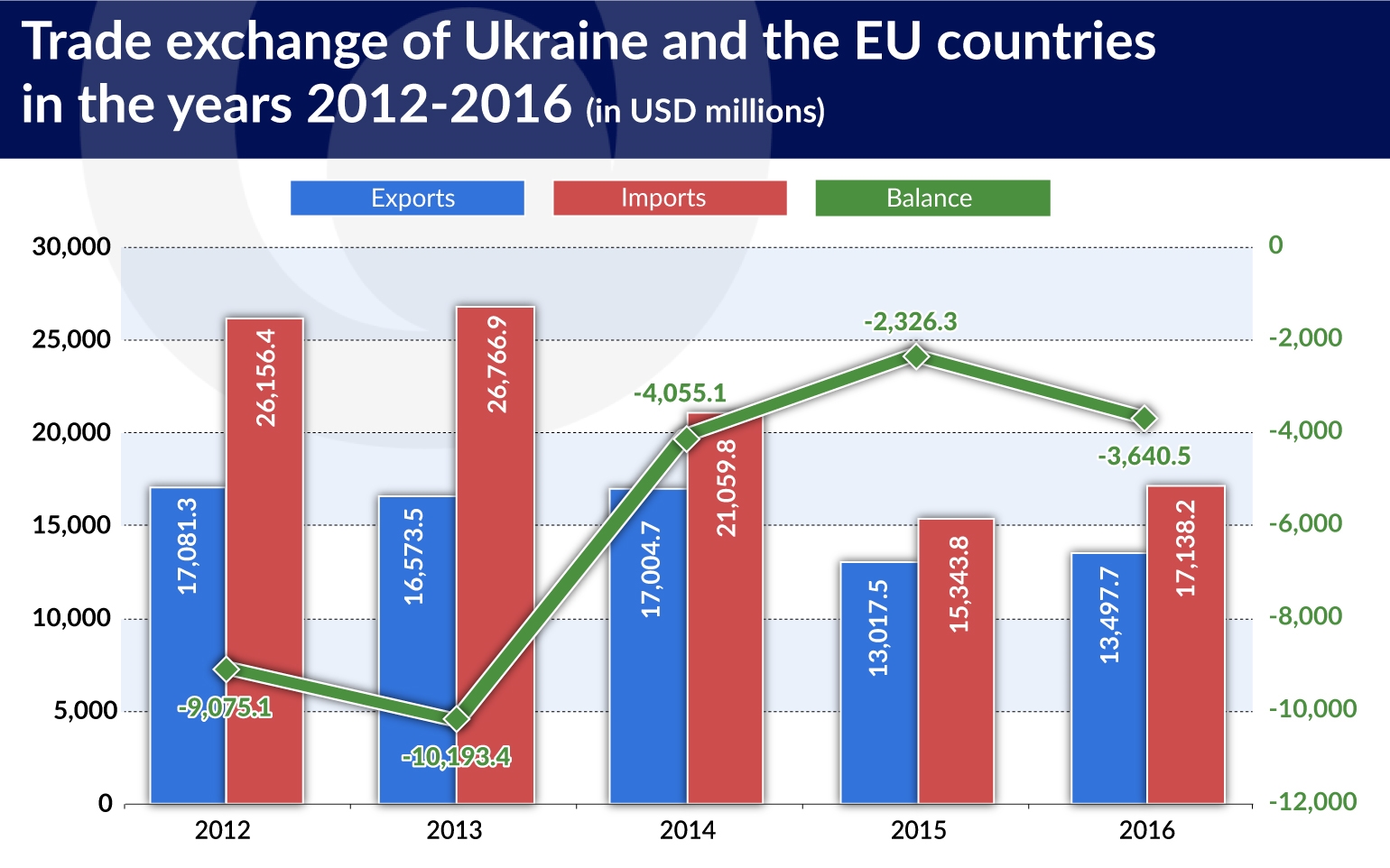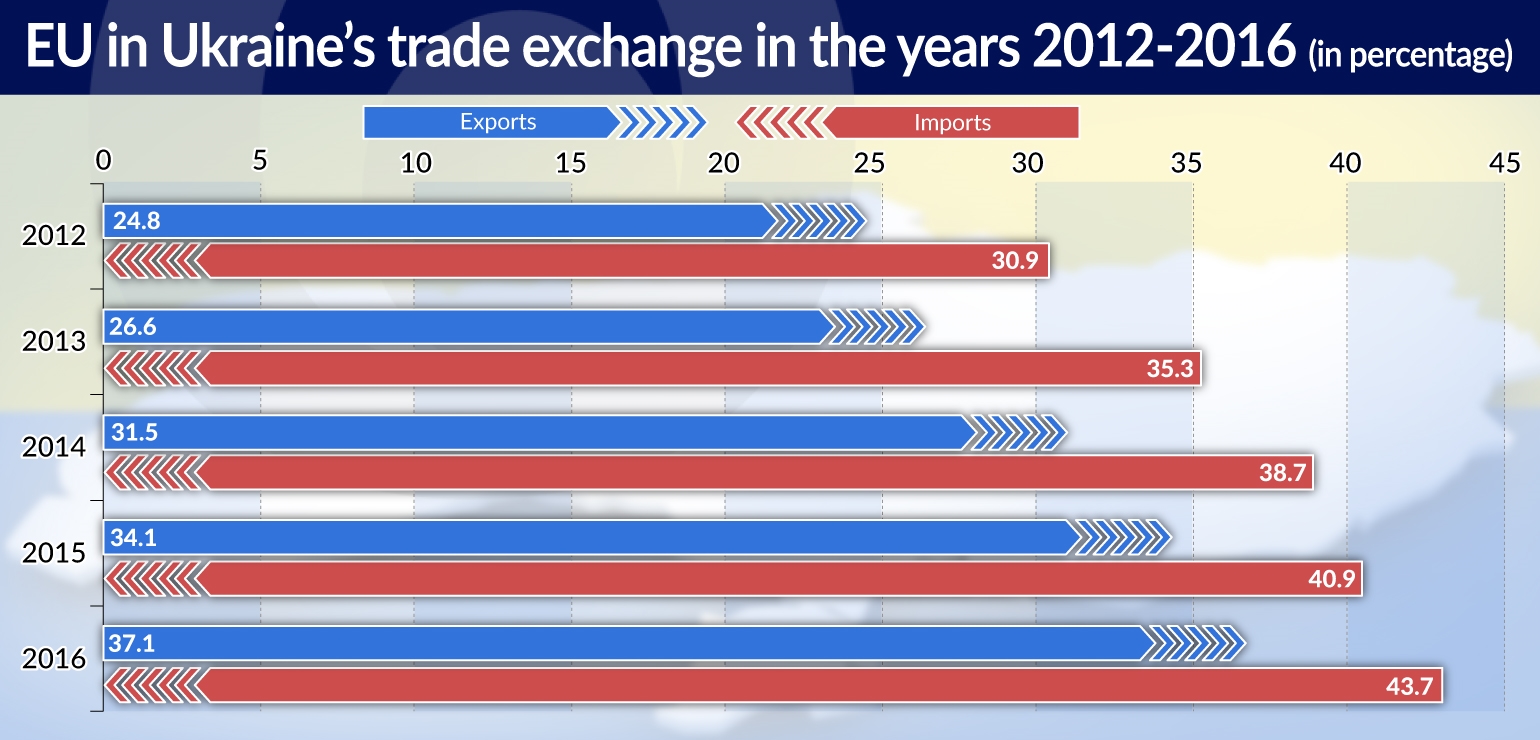However, the entourage of President Petro Poroshenko increasingly voices opinions critical of the ties with the EU and supporting a return to the pro-Russian economic orientation. The agreement on a free trade area between Ukraine and the European Union signed June 27th, 2014, only entered into effect on January 1st , 2016, due to the opposition of the Kremlin.
According to the State Statistics Service of Ukraine in 2016 the exports of Ukrainian goods to the EU Member States amounted to almost USD13.5bn and were almost USD0.5bn higher than a year before. At the same time the imports increased from USD15.3bn in 2015 to USD17.1bn.
Poland at the top, while Russia’s position is waning
In 2016 the main recipient of goods exported by Ukrainian producers was Poland, which accounted for 16.3 per cent of all exports to the EU. Poland has overtaken Italy (14.3 per cent) and Germany (10.5 per cent). Poland was ranked second after Germany (25.2 per cent) on the list of the biggest EU exporters to Ukraine with 15.7 per cent of the EU exports.
The increase of the European Union’s participation in the Ukrainian exports was slightly higher than the increase of its participation in the structure of Ukrainian imports. The former grew by 3 per cent – from 34.1 per cent in 2015 to 37.1 per cent in 2016. In the same time the latter increased by 2.8 per cent – from 40.9 per cent in 2015 to 43.7 per cent a year later.

The process of increasing trade in goods between Ukraine and the EU was accompanied by a parallel process of decreasing Polish neighbor’s dependency on trade exchange with the countries of the Commonwealth of Independent States, and especially Russia. Ukrainian exports to these countries decreased by USD1.8bn to just over USD6bn, while the imports fell by USD1.9bn, reaching the level of USD8.6bn.
In a situation of military aggression on the part of Russia, the ability to decisively limit its influence as Ukraine’s trading partner is certainly one of the clear advantages of a free trade area between the EU and Kiev.
During the first year of the agreement on the free trade zone, the situation in terms of the exchange of services between Ukraine and the EU was quite different than the situation in the trade in goods. The export of services from Ukraine exhibited a slight growth (0.8 per cent) and reached USD2.9bn. In the same time the imports of services decreased by 15 per cent to the level of the USD2.36bn, which gave Ukraine a positive balance more than three times higher than in 2015 – USD614m against USD178m.
All eyes on agriculture
The agricultural and food sector currently represents one-third of the Ukrainian exports. It is therefore no wonder that the issues associated with this field are constantly in the spotlight on the Dnieper.
According to the data of Agroconsult, an Ukrainian website dedicated to the agricultural industry, 300 manufacturers from Ukraine were able to benefit from the possibility of supplying goods covered by duty free import quotas to the European market. The main goods exported last year by the Ukrainian agricultural and food sector to the EU included honey, oats, sugar, malt, gluten, processed tomatoes, apple juice and grape juice, chicken meat, wheat, groats, corn flour and barley flour. The sizes of the quotas often do not meet the expectations of the Ukrainian exporters. At the same time, as noted by Agroconsult, in certain commodity groups the duty-free quotas were not exhausted.
Saboteurs from Kiev
In order to adapt the legislative situation in Ukraine to the provisions of the agreement on association with the EU, it is necessary to implement more than 350 EU Directives, thoroughly rebuilding the Ukrainian legal system. According to the Ukrainian parliamentary expert Denis Chernikov, the legislature is completely not up to the task.
Already in May 2016, the Ukrainian Eastern Partnership Civil Society Forum issued an appeal to the authorities, calling for an acceleration of the work on the legislative changes, presenting a list of 21 acts that should be adopted immediately, and pointing out the possible negative consequences of delays for Ukraine.
„Dragging out the process of adaptation of national legislation could lead not only to the loss of political dividends, possible increase of dissatisfaction of the Ukrainians due to the tardiness of the officials and legislators, but also quite real and foreseeable legal consequences. International judicial practice shows that after signing a relevant agreement and taking on specific commitments, partner states of the EU can no longer invoke the standards of their national legislation in order to avoid these obligations,” concluded the authors of the appeal.
„It would appear that we can be proud of how uproariously we are celebrating the anniversary of the temporary implementation of the association agreement between Ukraine and the European Union. But the parliament was not even able to adopt 20 strategically important draft laws, which are necessary for European integration. What’s more, the experts prematurely rejoiced at the adoption of environmental laws [included in the „EU” package – author’s note]. The president vetoed the law on the assessment of the environmental impact of investments,” commented the information portal „Evropeiska pravda” in the autumn of last year.
Not much has changed in this area since then. Brussels is openly pointing out the problems related to the implementation of the provisions of the association agreement, which includes the agreement on the free trade area.
„It is clear that today the implementation of the agreement is difficult for several reasons. The first is corruption. The second is the rule of law and human rights. And the third is the need to strengthen the state’s management capabilities,” said the representative of EU diplomacy Dirk Schuebel in February of this year, as quoted by the Ukrainian state-owned news agency Ukrinform.
Dreams of Russia are still alive
Despite the benefits that Ukraine is reaping from the association with the European Union, the Ukrainian oligarchs are still trying to play both sides of the fence. In the statements directed towards the European partners Poroshenko has been assuring for years that Ukraine’s development is oriented towards Europe.
„Our choice is to build a strong democracy that will take its rightful place in the family of European states. For us the European Union is a success story, an example of a successful state, a time-tested model of reforms. And that’s why tomorrow as the President of Ukraine I will sign the agreement on association with the European Union. When they asked me: What is your presidential reform program? it was very easy to respond: The Association Agreement. Everything is there,” assured Poroshenko on the eve of signing of the agreement on Ukraine’s association with the EU in June 2014.
Today on the internal stage a confidante from his team is talking about the harmful effects of Ukraine’s association with the European Union and preparing ground for a pro-Russian shift. At the beginning of March Viktor Medvedchuk harshly criticized the Association Agreement in a series of articles published on the web portal „Korrespondent”, associated with the former President Viktor Yanukovych. Medvedchuk is a representative of Petro Poroshenko in the ongoing Minsk talks concerning the conflict in the Donbass region, and is considered to be Putin’s no. 1 man in Ukraine. Putin is the godfather of Medvedchuk’s daughter, and Medvedchuk himself is the leader of the pro-Kremlin organization the Ukrainian Choice, which wants Ukraine to join the Customs Union endorsed by Russia.
„The Ukrainian Choice warned long before the signing of the association agreement with the EU that the selection of the Western orientation of economic integration is wrong and that the area of the so-called free (and additionally „deep and comprehensive”) trade with the EU includes almost 400 exceptions and limitations, and is discriminatory towards Ukraine. EU countries see Ukraine solely as a supplier of raw materials,” commented Medvedchuk.
„The Ukrainian euro-integrators maintain with maniacal stubbornness that the country’s ‘civilized’ choice cannot be changed. Such irrational approach could lead to disastrous consequences,” argued the representative of Poroshenko, presenting a long list of alleged „losses of the Ukrainian economy caused by the association with the EU”.



